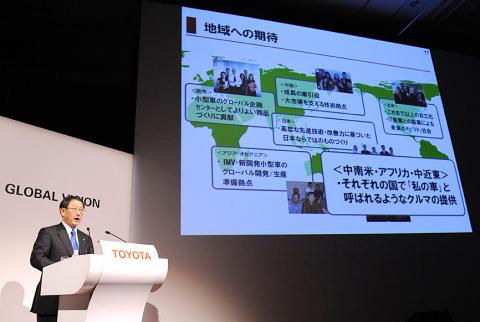Toyota Motor Corp said it would accelerate a push into emerging markets and launch more hybrid models as it aims to nearly double profits under a new long-term strategy.
The world’s largest car maker, trying to move on from a massive global recall, also unveiled plans to reduce its board to 11 members by June from 27 to speed up decision-making as part of a new plan unveiled on yesterday.
Toyota has been struggling to improve its profit margins, which are weaker than those of Japan’s No. 2 Nissan Motor Co Ltd and third-ranked Honda Motor Co Ltd. Toyota stayed ahead of General Motors Co of the US as the world’s biggest automaker, but by a thinner margin last year.

Photo: AFP
Although Toyota’s lossmaking, export-dependent operations in Japan remain a major drag because of the strong yen, its shares have outperformed recently as some analysts expect profitability to improve with the adoption of efficient manufacturing technologies and further cost cuts.
Under its “global vision” strategy, Toyota said it would aim for an operating profit of ¥1 trillion (US$12 billion) and a profit margin of 5 percent, against an estimated ¥550 billion and 2.9 percent in the current fiscal year ending this month.
It did not give an exact time frame for the targets.
The plan, unveiled by Toyota president Akio Toyoda, also called for Toyota to launch about 10 more hybrid models by 2015. It expects emerging markets to make up half of its sales by 2015, up from 40 percent now.
Since taking the job in June 2009 in the aftermath of the global financial crisis, Toyoda, grandson of the company’s founder, has often spoken of the need to go back to the basics of “making better cars and contributing to society.”
That vision became a directive as a recall of millions of cars, mainly for complaints of unintended acceleration, damaged Toyota’s once-impeccable quality image, especially in the important US market.
Toyota has recalled nearly 20 million vehicles worldwide since 2009.
Executives say that, under Toyoda’s leadership, the company has veered away from market share targets that used to be a major driver for growth during its boom years in the past decade.
While many, including Toyoda, blamed the rapid, unchecked growth as part of the problem behind the recalls, the chief executive is caught between his drive to focus more on customers — even if that means slowing down vehicle development — and shareholders’ desire for profit growth and returns.
Shares of Toyota closed up 0.4 percent ahead of the announcement, roughly in line with the market.

BYPASSING CHINA TARIFFS: In the first five months of this year, Foxconn sent US$4.4bn of iPhones to the US from India, compared with US$3.7bn in the whole of last year Nearly all the iPhones exported by Foxconn Technology Group (富士康科技集團) from India went to the US between March and last month, customs data showed, far above last year’s average of 50 percent and a clear sign of Apple Inc’s efforts to bypass high US tariffs imposed on China. The numbers, being reported by Reuters for the first time, show that Apple has realigned its India exports to almost exclusively serve the US market, when previously the devices were more widely distributed to nations including the Netherlands and the Czech Republic. During March to last month, Foxconn, known as Hon Hai Precision Industry

Taiwan Semiconductor Manufacturing Co (TSMC, 台積電) and the University of Tokyo (UTokyo) yesterday announced the launch of the TSMC-UTokyo Lab to promote advanced semiconductor research, education and talent development. The lab is TSMC’s first laboratory collaboration with a university outside Taiwan, the company said in a statement. The lab would leverage “the extensive knowledge, experience, and creativity” of both institutions, the company said. It is located in the Asano Section of UTokyo’s Hongo, Tokyo, campus and would be managed by UTokyo faculty, guided by directors from UTokyo and TSMC, the company said. TSMC began working with UTokyo in 2019, resulting in 21 research projects,

Ashton Hall’s morning routine involves dunking his head in iced Saratoga Spring Water. For the company that sells the bottled water — Hall’s brand of choice for drinking, brushing his teeth and submerging himself — that is fantastic news. “We’re so thankful to this incredible fitness influencer called Ashton Hall,” Saratoga owner Primo Brands Corp’s CEO Robbert Rietbroek said on an earnings call after Hall’s morning routine video went viral. “He really helped put our brand on the map.” Primo Brands, which was not affiliated with Hall when he made his video, is among the increasing number of companies benefiting from influencer

Quanta Computer Inc (廣達) chairman Barry Lam (林百里) yesterday expressed a downbeat view about the prospects of humanoid robots, given high manufacturing costs and a lack of target customers. Despite rising demand and high expectations for humanoid robots, high research-and-development costs and uncertain profitability remain major concerns, Lam told reporters following the company’s annual shareholders’ meeting in Taoyuan. “Since it seems a bit unworthy to use such high-cost robots to do household chores, I believe robots designed for specific purposes would be more valuable and present a better business opportunity,” Lam said Instead of investing in humanoid robots, Quanta has opted to invest